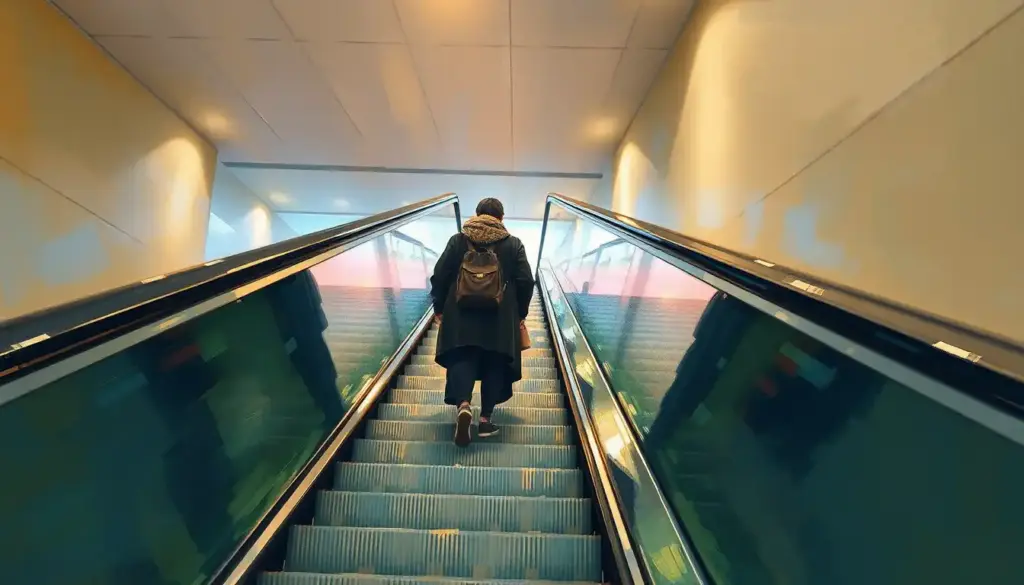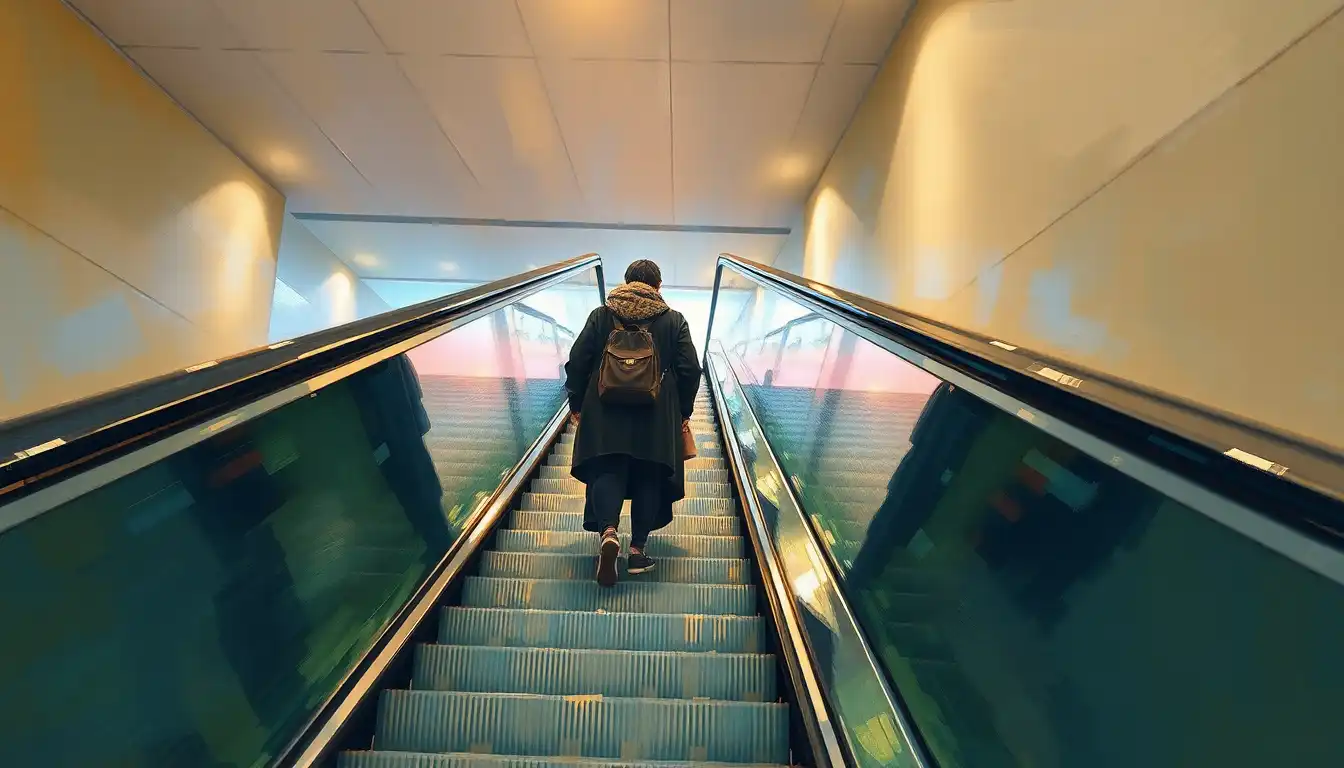
Escalator Phobia: Understanding and Overcoming Escalaphobia
Escalators, those ubiquitous moving staircases found in shopping malls, airports, and subway stations, are designed for convenience. However, for some individuals, these seemingly innocuous devices trigger intense fear and anxiety. This fear, known as escalator phobia, or escalaphobia, is a specific phobia characterized by an irrational and excessive fear of riding escalators. This article delves into the causes, symptoms, and effective strategies for overcoming escalator phobia.
What is Escalator Phobia (Escalaphobia)?
Escalator phobia, also known as escalaphobia, is a specific anxiety disorder centered around the fear of escalators. It falls under the broader category of phobias, which are characterized by persistent and excessive fears of specific objects or situations. People with escalator phobia experience significant distress when confronted with escalators, often leading to avoidance behaviors. This fear can significantly impact their daily lives, limiting their ability to access certain locations or use public transportation.
Unlike a simple dislike or apprehension, escalaphobia involves a deep-seated fear that is disproportionate to the actual danger posed by escalators. Individuals with this phobia may recognize that their fear is irrational, but they are unable to control it. This can lead to feelings of helplessness and frustration.
Causes of Escalator Phobia
The exact causes of escalator phobia are complex and can vary from person to person. However, several factors are believed to contribute to its development:
- Traumatic Experiences: A past experience involving an escalator, such as a fall, getting clothing caught, or witnessing an accident, can trigger the development of escalator phobia. These experiences can create a strong association between escalators and danger.
- Learned Behavior: Phobias can be learned through observation. If someone witnesses a family member or friend exhibiting fear or anxiety around escalators, they may develop a similar fear.
- Genetic Predisposition: Some individuals may be genetically predisposed to anxiety disorders, making them more vulnerable to developing specific phobias like escalator phobia.
- General Anxiety: People with generalized anxiety disorder (GAD) or other anxiety disorders may be more likely to develop specific phobias, including escalaphobia. Their heightened anxiety levels can make them more sensitive to potential threats, even those that are relatively harmless.
- Information and Media: Sensationalized news reports or stories about escalator accidents can contribute to the development of fear, especially in individuals already prone to anxiety.
Symptoms of Escalator Phobia
The symptoms of escalator phobia can manifest both physically and psychologically. These symptoms are often triggered by the mere sight of an escalator or the thought of having to ride one. Common symptoms include:
- Physical Symptoms:
- Rapid heartbeat
- Sweating
- Trembling or shaking
- Shortness of breath
- Dizziness or lightheadedness
- Nausea
- Muscle tension
- Psychological Symptoms:
- Intense fear and anxiety
- Panic attacks
- Feelings of dread or impending doom
- Obsessive thoughts about escalators
- Avoidance of escalators
- Difficulty concentrating
- Irritability
The severity of symptoms can vary depending on the individual and the specific situation. Some people may experience mild anxiety, while others may have full-blown panic attacks. The fear and anxiety associated with escalator phobia can significantly impact a person’s quality of life, leading to avoidance behaviors and social isolation.
Diagnosis of Escalator Phobia
Escalator phobia is typically diagnosed by a mental health professional, such as a psychologist or psychiatrist. The diagnosis is based on the criteria outlined in the Diagnostic and Statistical Manual of Mental Disorders (DSM-5). To be diagnosed with a specific phobia, such as escalaphobia, an individual must meet the following criteria:
- Marked and persistent fear that is excessive or unreasonable, cued by the presence or anticipation of an escalator.
- Exposure to the escalator almost invariably provokes an immediate anxiety response, which may take the form of a panic attack.
- The person recognizes that the fear is excessive or unreasonable (this may be absent in children).
- The phobic situation (escalator) is avoided or endured with intense anxiety or distress.
- The avoidance, anxious anticipation, or distress in the feared situation interferes significantly with the person’s normal routine, occupational (or academic) functioning, or social activities or relationships, or there is marked distress about having the phobia.
- The fear, anxiety, or avoidance is persistent, typically lasting for 6 months or more.
- The anxiety, panic attacks, or phobic avoidance are not better accounted for by another mental disorder.
Treatment Options for Escalator Phobia
Fortunately, several effective treatment options are available for overcoming escalator phobia. These treatments typically involve a combination of therapy and, in some cases, medication.
Cognitive Behavioral Therapy (CBT)
Cognitive behavioral therapy (CBT) is a type of psychotherapy that focuses on identifying and changing negative thought patterns and behaviors. CBT is considered the gold standard treatment for specific phobias, including escalator phobia. During CBT sessions, a therapist will help the individual to:
- Identify and challenge negative thoughts about escalators.
- Develop coping strategies for managing anxiety.
- Gradually expose themselves to escalators in a safe and controlled environment (exposure therapy).
Exposure Therapy
Exposure therapy is a key component of CBT for phobias. It involves gradually exposing the individual to the feared object or situation (in this case, escalators) in a safe and controlled environment. The exposure is typically done in a hierarchical manner, starting with less anxiety-provoking situations and gradually progressing to more challenging ones. For example, the individual might start by looking at pictures of escalators, then watching videos of escalators, then standing near an escalator, and finally, riding an escalator. [See also: Overcoming Fear Through Exposure Therapy]
The goal of exposure therapy is to help the individual to desensitize themselves to the feared object or situation and to learn that their fears are unfounded. With repeated exposure, the anxiety associated with escalators will gradually decrease.
Relaxation Techniques
Relaxation techniques, such as deep breathing exercises, progressive muscle relaxation, and mindfulness meditation, can be helpful in managing anxiety symptoms associated with escalator phobia. These techniques can help to calm the body and mind, reducing feelings of fear and panic. Learning and practicing these techniques can empower individuals to manage their anxiety in the moment, making exposure therapy more manageable.
Medication
In some cases, medication may be prescribed to help manage the anxiety symptoms associated with escalator phobia. Anti-anxiety medications, such as selective serotonin reuptake inhibitors (SSRIs) or benzodiazepines, can help to reduce anxiety and panic attacks. However, medication is typically used in conjunction with therapy, rather than as a standalone treatment. It is crucial to consult with a psychiatrist or medical doctor to determine if medication is appropriate and to discuss the potential risks and benefits.
Coping Strategies for Escalator Phobia
In addition to professional treatment, there are several coping strategies that individuals with escalator phobia can use to manage their fear and anxiety in everyday situations:
- Avoidance (Temporarily): While not a long-term solution, temporarily avoiding escalators when anxiety is overwhelming can provide immediate relief. This allows the individual to regain composure and prepare for future exposures. However, it’s important to balance avoidance with active steps toward overcoming the phobia.
- Planning Ahead: When visiting places with escalators, plan your route in advance and identify alternative options, such as elevators or stairs. This can help to reduce anxiety by providing a sense of control.
- Bringing a Companion: Having a trusted friend or family member accompany you when riding an escalator can provide support and reassurance. Their presence can help to calm your nerves and make the experience less frightening.
- Focusing on Your Breathing: Practicing deep breathing exercises can help to calm your body and mind when you feel anxious. Take slow, deep breaths, inhaling through your nose and exhaling through your mouth.
- Distraction Techniques: Engaging in distraction techniques, such as listening to music, counting, or focusing on your surroundings, can help to take your mind off your fear.
- Positive Self-Talk: Remind yourself that your fear is irrational and that you are safe. Use positive self-talk to challenge negative thoughts and beliefs about escalators.
Living with Escalator Phobia
Living with escalator phobia can be challenging, but it is important to remember that it is a treatable condition. With the right treatment and coping strategies, individuals with escalator phobia can overcome their fear and live fulfilling lives. Seeking professional help is a crucial first step in the recovery process. A therapist can provide guidance, support, and evidence-based treatments to help individuals confront their fears and develop effective coping mechanisms. [See also: Finding the Right Therapist for Your Phobia]
It’s also important to be patient and compassionate with yourself. Overcoming a phobia takes time and effort. There will be setbacks along the way, but it’s important to stay focused on your goals and celebrate your progress. With persistence and determination, you can overcome your fear of escalators and regain control over your life. Remember that many people experience specific phobias, and you are not alone. Support groups and online communities can provide a sense of belonging and understanding, allowing you to connect with others who share similar experiences.
Conclusion
Escalator phobia, or escalaphobia, is a real and treatable anxiety disorder that can significantly impact a person’s life. Understanding the causes, symptoms, and treatment options for escalator phobia is crucial for individuals seeking help and for those supporting loved ones with this condition. Through a combination of therapy, coping strategies, and self-compassion, individuals with escalator phobia can overcome their fear and regain the freedom to navigate the world without anxiety. If you or someone you know is struggling with escalator phobia, seeking professional help is a vital step toward recovery and a more fulfilling life. Overcoming escalator phobia is possible, and a brighter, less anxious future awaits.

